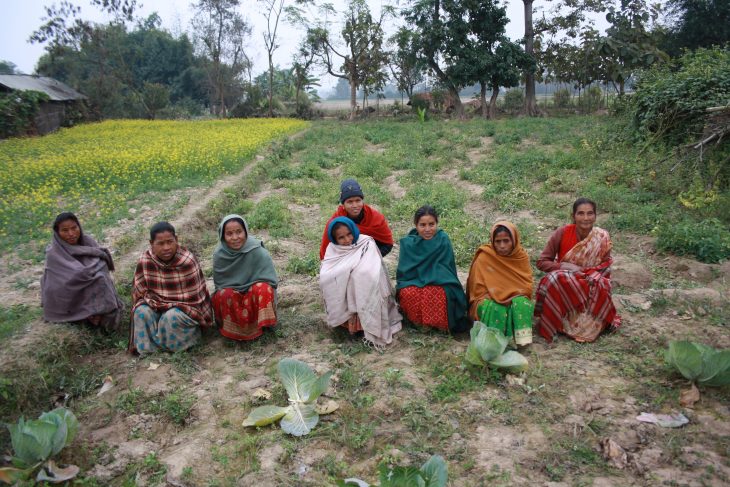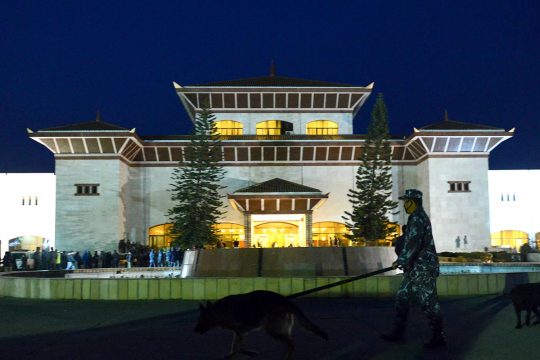Let’s come together and speak out for Madhesh, to address Madeshi’s agenda for justice and express our solidarity for peoples’ struggle for their rights, writes Ram Kumar Bhandari, founder of National Network of Families of the Disappeared and Missing Persons. The international partners, diplomatic community, civil society, media, intellectuals and general public must play a constructive role to investigate the Terai violence and contribute to a solution based on dialogue, non-violent action and effective communication. This is high time to act and work for sustainability, not to divide and rule against the minority.
During a recent visit to southern plains (Terai districts of Nepal), I met protestors, local activists and members of the public, both Madhesi and hill identity, where both suffer challenges to live in a secure environment. On the way back to Kathmandu in a public bus, a Madhesi citizen was badly humiliated by the hill passengers.
The upper caste rulling class [hill] and so called nationalists [centralist elites] term Madhesis [marginalised] as ‘Dhoti’, ‘vaiya’, ‘Madise’, ‘rastaghati’, ‘deshdrohi’, ‘kale’, ‘vele’ and more that hurt them at every step of life.
Kisundeo Mehta of Sunsari [terai district] expressed his frustration that the “Nepali state treats us as Indian, and the so called hill nationalists look on us as second-class citizens. Our main concern is to keep our Nepali identity as equal citizens”. Both the government and so-called nationalists have adopted an attitude of naming anyone raising voices of dissent as anti-national, which has divided the country and never addressed the rights agenda.
Indigenous rights denied
Our nation has suffered years of conflict, disputes and instability as exclusion and marginalisation by ethnicity, gender, caste and geography through the highly centralized elitism that must be broken to address the spirit of various historic movements and ongoing struggles. Pradip Chaudhary, a political activist [] in Udayapur district claimed that “the state completely suppressed us, abused our indigenous rights and we may become violent if they don’t listen to the struggle for our rights”. Chaudhary adds ‘if the state does not understand our identity, the issues of poverty linked to land disputes and a lack of representation, we will have no option other to move towards a unified revolt’.
Why have local struggles and peoples’ movements failed in Nepal? People have sacrificed and struggled for change, and seen the new political dispensation turn into a corrupt industry through which peoples’ suffering continues and movements end with current leaders gaining greater power while there is no transformation in ordinary Nepalese lives. Mohan Gole, an ethnic [marginalised Indigenous groups] activist said ‘I am with Madhes for its struggle for identity and dignity, if the establishment does not hear peaceful slogans, we will continue to sacrifice; we can not tolerate state atrocities and must answer their violence through violent action’. Due to the extreme exclusionary approach of the Nepalese State, polarization is shaping severe division within communities and the expectations of a new growing middle class in the region is not met as per their demands, while minorities become increasingly marginalized. Phunde Rasaili, a dalit [untouchable] activist said ‘It’s a fight against discrimination and routine marginalization, our struggle continues.” The poorer you are, the more you are marginalized and the more you suffer. The main driver of the Madhes revolt today is the unfair treatment, discrimination and state oppression that has continued for years. If the ongoing struggle ends without addressing madhesi agenda at the top, the growing middle class and radicalized new generation may not follow their corrupt leaders and the movement could assume more violent forms. Kathmandu must listen Madhesi peoples’ demand with a solid commitment to address peoples’ agenda.
Disappeared people
The families of those disappeared during autocratic King’s regime [Panchayat era] (1987), such as Sakeshchandra Mishra from Dhanusha, still don’t know what happened to their loved ones. The Mallick Commission (1990) report has never been published and the nation did not learn the truth of those violations. Political activist Rambrikshya Yadav was tortured and killed by state forces in 1995, before the Maoist conflict. His family has never learned the facts of the incident or seen the perpetrators punished. Hundreds of Madhesi activists, members of the general public and journalists were disappeared, tortured, raped, killed and displaced by state forces. The infamous Dhanusha 5 [Dhanusa is centre of Madhes and a district boarder to India, where 5 student activists were disappeared and killed by the state forces during conflict, which is known as Dhanusa 5] disappearance case (2004) by the state has been investigated by the National Human Rights Commission, but the families still suffer and the known perpetrators still hold posts with Nepali security forces and to date have gone unpunished. Bimala Devi of Dhanusha said “how long should we follow the killers and abusers” and added “they (the state) detained, tortured and killed my son, lied to us and are still not punishing the perpetrators, how can I believe that they will provide justice to us”.
The Rayamajhi Commission’s (2006) findings were similarly never made while alleged perpetrators were both protected and promoted. The Comprehensive Peace Agreement (2006) and the Interim Constitution (2007) pledged to form the truth and reconciliation commission (TRC) and the Commission of Investigation on Enforced Disappeared Persons (CIEDP) through a political negotiation to deal with the conflict related crimes of the ‘Peoples’ War’ (1996-2006) with the aim to immediately address conflict victims’ right to know the truth, and justice, and provide reparation to the families, institutional reform and guarantee of non-repetition. After 10 years of the war, little progress has been made, and while the government formed the transitional justice bodies - TRC and CIEDP (Feb 2015) – they were formed at the state level without proper consultation with public and victims community. Both commissions have been operational for one year and have failed to reach out to victims, a lost opportunity of the state-led transitional justice bodies.
Madhesi victims
Furthermore the commissions have no mandate to investigate and deal with Madhesi victims victimized in the post conflict period during the Madhes movement (2007) and the ongoing struggle in Madhes during the constitution building and post constitution conflict of the recent past.
The above cases are representative of state violations in Madhes with hundreds of killings in the aftermath of conflict and post constitution violations, where is no mechanism to address state violations and to respect people’ lives. This is a time for Nepal to bring all citizens into a justice framework. The Nepali state is not listening to the Madhesi people and not addressing their demands being made through peaceful means. The so-called political leaders have been abusing the marginalized and engaging in a politics of victimhood without respecting victims’ rights to truth and justice. It’s a shame for the leaders and state that they have forgotten the stories of our recent and shared past.
From Bhardaha of Saptari to Rangeli of Morang [origin of Madhes protest and killing, where innocent people were killed and tortured, the places in the southern plains] the recent killings of 60 people who spoke out and fought for their right to identity, equal rights and democracy, should be addressed and investigated by the state. This is an issue of state accountability to state responsibility for its citizens. If government and the current politics fail to address a peaceful campaign and a local struggle for justice, violations may continue and the belief in peaceful protest will weaken. This will foster a culture of militancy in society and potentially push the region towards a long running violent conflict. A concern is that the state is both ready and prepared for such a conflict.
In such a chaotic political climate, how can the Madhesi people trust state-led transitional justice bodies that are not responsible or receptive to victims of conflict? To build trust and hope for justice, state mechanisms must open a door for all to bring them into a system through equal treatment and respect. To address peoples’ rights and link these to current transitional justice needs, government should form an Independent Inquiry into Violence (IIV) in the Terai to maintain peace and order, and to find a long-term solution through democratic and a peaceful means.






